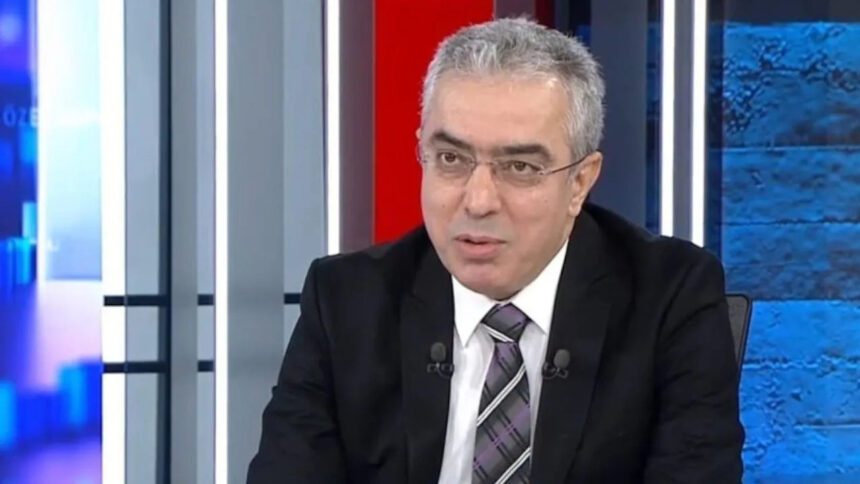In an article addressing the process that began with MHP leader Devlet Bahçeli’s call and continued with the DEM Party delegation’s visit to PKK leader Abdullah Öcalan, Presidential Chief Advisor and Deputy Chair of the Presidential Legal Policies Board Mehmet Uçum emphasized:
“The State Initiative to end terrorism is very clear: Terrorism will be continuously ended in every sense and every arena. This has no connection with any other issue. There is no negotiation or compromise. Seeking consensus, forming commissions, or invoking legislative authority to end terrorism is absurd. These merely hinder the process. The State will put an end to terrorism’s actions, rhetoric, tutelage, and organization everywhere, under all circumstances.”
Uçum shared his weekly article on his X account, stating the following:
“After the Cabinet meeting on January 6, President Erdoğan gave a clear message: ‘As the government and the alliance, we will achieve our goal of a Terror-Free Turkey, one way or another.’
In this message, alongside the security measures for realizing a Terror-Free Turkey, there is also a warning not to exploit the State Initiative taken to activate different possibilities.
The first thing that stands out is the attempt to portray this new phase as if it were a negotiation, to put on political shows via the İmralı meeting, and to bring new actors into the matter. Such attitudes would destroy a historic opportunity. Those who have taken responsibility with the opportunities provided by the State, and those who are politically accountable, must act with the utmost care to prevent any potentially damaging outcomes.”
Uçum went on to criticize the revival of rhetoric like independence and autonomy, which he described as part of an “imperialist project” targeting Turkey’s unity:
“They are once again putting forward the language of an external Kurdish issue—an imperialist project—with notions of independence, autonomy, and the like. Turkish citizenship, which is a legal bond, is being reduced to an ethnic identity. They are emphasizing the so-called ‘equal citizenship’ discourse, essentially derived from the artificial external Kurdish issue and the ‘two nations’ thesis, without explaining what they actually mean by equal citizenship. All this is a path that leads to the partition of Turkey.”
Uçum underscored that, according to Turkish law, citizenship is defined by a legal bond rather than ethnicity, religion, or race, and that there is no legal shortcoming regarding equal citizenship. He also criticized those who, by referencing Gaza, appeared to threaten the State and the people with chaos, turmoil, and destruction, as well as those who pointlessly or maliciously discuss topics such as the right to hope (umut hakkı), house arrest, and amnesty. He noted that Bahçeli only mentioned the right to hope contingent upon “the end of terrorism, the surrender of terrorists, and the dissolution of the terrorist organization.”
Addressing claims that the process is linked to President Erdoğan’s potential re-election, Uçum said:
“Those who connect this to President Erdoğan running for office again are utterly misguided. Even though there is a constitutional possibility (Article 116/3) for President Erdoğan’s exceptional candidacy, some falsely claim they are trying to remove a so-called constitutional obstacle to his candidacy and persist in this lie.”
Uçum added that the goal of a Terror-Free Turkey pertains to the present, whereas any possibility of an exceptional candidacy for President Erdoğan might only come up in the second half of 2027:
“These two issues cannot be connected, neither in terms of timing nor in their essential nature.”
He also addressed those who tie the matter to a potential new constitution:
“Even without a new constitution, Turkey will not abandon its goal of being free of terrorism. If a new constitution does come about, it has repeatedly been stated that there would be no changes to the first four articles, nor to the names ‘Turkish Nation’ and ‘Turkish Citizenship.’ Of course, the gains of the Republic and our democratic tradition will be protected. No one has the power to harm these; their guarantor is the Turkish Nation.”
He continued:
“Certainly, it is possible—with broad consensus—to create a new constitution that develops democracy, social justice, and rights and freedoms. That expectation is legitimate. However, a new constitution is not inherently a direct component of the Terror-Free Turkey objective.”
Summarizing the central point, Uçum stressed:
“The State Initiative to end terrorism is very clear: Terrorism will be ended in every sense and every arena. This has no connection with any other issue. There will be no negotiation or bargain. Seeking consensus, forming commissions, or referring to legislative authority to end terrorism is absurd. These merely complicate the process. The State will put an end to terrorism’s actions, language, tutelage, and organization everywhere and under all conditions.”



